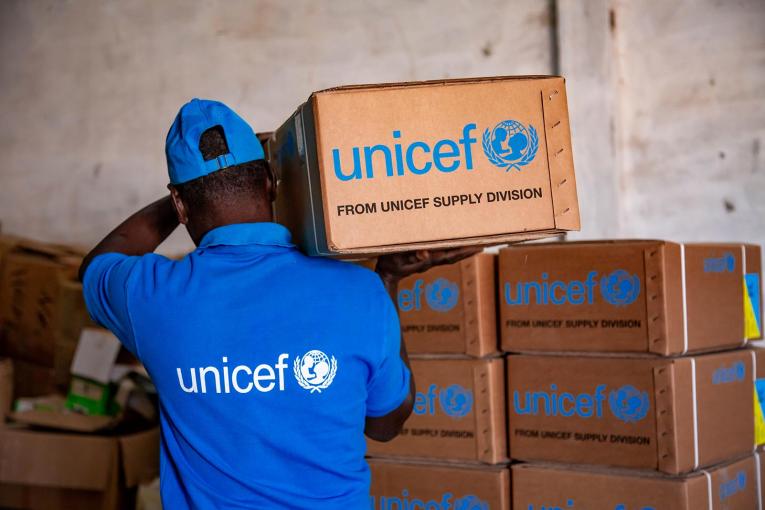
UNICEF supply operations reach record highs in 2020 amid global fight against COVID-19 pandemic
UNICEF Supply Division, 3 June 2021
UNICEF’s global procurement and supply operations grew by 17 per cent in 2020 to reach a record US$4.468 billion, underscoring the organization’s role in supporting governments’ response to the COVID-19 pandemic.
Global demand for medical supplies surged early last year, as borders were closing, export bans were being imposed and international freight capacity shrank. To cope with these challenges, UNICEF capitalized on decades of experience in supply and logistics, its relationship with suppliers and its work with governments and partners.
“The supply and logistics challenges of 2020 were not only unprecedented, but extremely complex,” said Henrietta Fore, UNICEF’s Executive Director. “Together with partners, UNICEF leveraged its strengths to continue sourcing, procuring and delivering life-saving supplies, despite the magnitude of the crisis.”
In its Supply Annual Report released today, UNICEF said that in 2020 it shipped more than 200 million medical masks, 195 million gloves, 5.7 million gowns, 3.3 million COVID-19 molecular diagnostic tests and 16,795 oxygen concentrators to 139 countries in support of the pandemic response.
Despite the unique challenges posed by COVID-19, UNICEF’s regular work procuring and delivering supplies for children was not interrupted. This included the delivery of over 2 billion vaccine doses to ensure vital routine immunization programmes were maintained, according to the report.
“Ingenuity and perseverance were key to address the many challenges as they emerged,” said Etleva Kadilli, Director of UNICEF’s Supply Division. “From market shaping to stockpiling, tendering to transporting – never before have we worked with such speed, agility and scale across every aspect of the supply chain.”
UNICEF also continued its support to complex emergencies including the Central Sahel, Syria, Venezuela and Yemen. In 2020, UNICEF procured emergency supplies, including for the pandemic response, worth US$682.5 million for children and communities in 143 countries and territories – almost double the figure for 2019.
The report also highlights UNICEF’s contribution to the COVAX Facility, the global mechanism that promotes equitable access to COVID-19 vaccines. So far in 2021, UNICEF has coordinated deliveries of COVID-19 vaccines to 129 countries and territories.
Stressing the importance of cooperation with national and international partners, including the private sector, in achieving these results, the report highlights some key initiatives such as:
- A landmark joint charter with the World Economic Forum in which 18 airline and logistics companies pledged to prioritize the transport of COVID-19 vaccines procured through the COVAX Facility;
- Leading a collaborative joint tender on behalf of 11 United Nations agencies and 2 international NGOs to establish long-term arrangements (LTAs) for procuring quality personal protective equipment;
- Convening the first ever logistics industry consultation, to align stakeholders around a strategy for the COVID-19 response;
- Development of innovative transport solutions to ensure delivery of vaccines for routine immunization in hard-to-reach areas.
The strategic leveraging of UNICEF’s purchasing power achieved savings of US$176 million for governments and donors in 2020, the report says.
More information on how UNICEF has made a difference in the lives of children in 2019 can be found in the 2020 Supply Annual Report.
UNICEF’s long-term work for children around the world is made possible thanks to partners, supporters and donors. For more information on UNICEF’s work to provide access to life-saving products where they are most needed, visit UNICEF Supply Division.
Original article here.